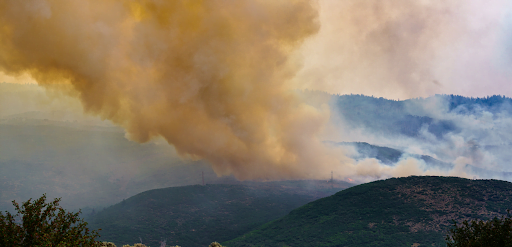COPD and Wildfires: Tips to Handle Smoky Air
Summer can be a lovely time to be outside, but it can also come with hazards like wildfires and smoke. Depending on the area where you live, you may be exposed to extremely poor outdoor air quality for months at a time, which can be dangerous if you have a condition like COPD. While you generally can control the air quality inside your home, none of us have much control over what’s going on outside, and this can be stressful for anyone with pulmonary or respiratory issues.

It’s always a good idea to pay attention to air quality ratings (also called the air quality index or AQI), but during wildfire season, it’s absolutely vital. You may not always be able to tell how hazardous the air is just by looking out your window. Thankfully, air quality measurements are easy to find on weather apps and news channels. If you have a condition like COPD, asthma, pulmonary fibrosis, or something similar, it’s smart to stay indoors as much as possible on moderate to severe air quality days.
When wildfires are burning nearby, the air may be filled with smoke, ash, and other particulates that are especially irritating to the lungs and throat. Even people without COPD can experience symptoms after breathing this air for too long. Make sure you know your own unique signs of a COPD exacerbation, and when to seek medical care. With the right tools, such as a portable oxygen concentrator, you can reduce your symptoms and take good care of yourself during times of poor air quality. It is important to be aware of ways to help COPD in smoky air before the need arises.
If you do have to go out and about, it’s a great idea to wear a special mask, such as the N95, and bring your portable oxygen concentrator with you. Try to limit your outdoor exposure to necessary errands only, and consider doing your activities or exercising inside for a while. Make sure your oxygen concentrator is working properly and you’ve followed the directions for proper care and cleaning, so you know it’s helping to purify the air efficiently and help manage your COPD in smoky air.
Talk with your doctor about using an inhaler, if you don’t already use one. These short-acting medicines can be very effective when your symptoms are triggered by smoke or dust in the air. And if you have an inhaler, make sure you bring it with you when you leave the house.
It’s never fun having to deal with the effects of wildfire smoke, especially for those with sensitive lungs, but with a few smart choices, it’s manageable. Keep these tips in mind in order to keep yourself as healthy and safe as possible with COPD, asthma, or other respiratory issues.
Need help finding the best portable oxygen concentrator to help your COPD in the smoky air? Reach out to Portable Oxygen Solutions today!
